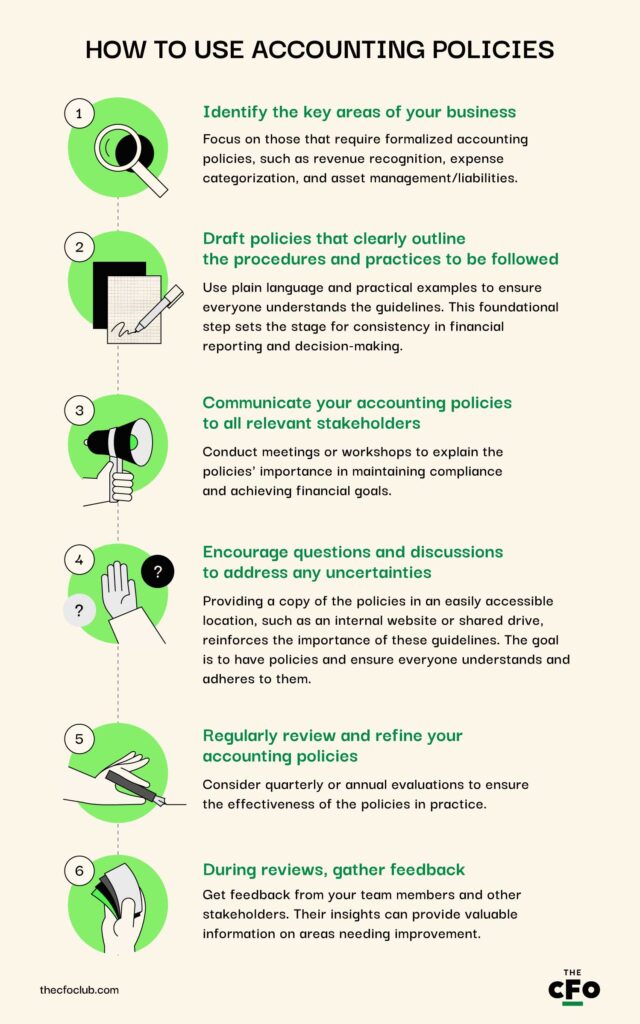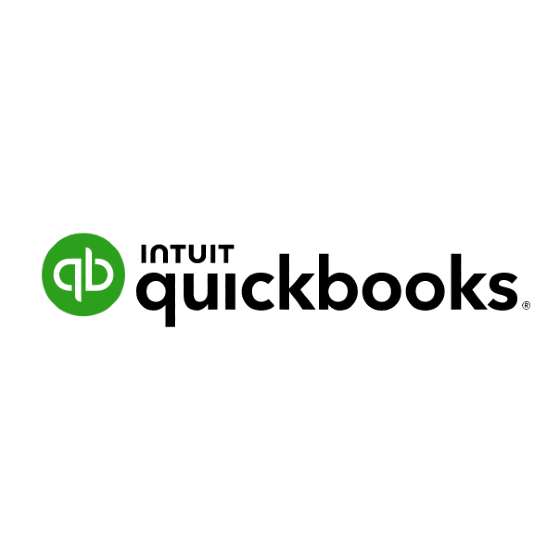Accounting for Regulation: Accounting policies are specific rules and procedures companies use to build financial statements compliant with IFRS or GAAP. They can either be conservative or agressive.
Create a Winning Strategy: Before you build your policy, you need to identify key areas of your business. Once that's ready, you can draft your policy, communicate it to stakeholders, and address concerns as they appear.
Trust Building Policies: Accounting policies may be difficult to draft, but their benefits, such as transparency, improved compliance, and enhanced financial reporting long outlast the negatives.
Accounting policies are the rules businesses follow to record and report finances, ensuring accuracy, consistency, and compliance.
But that’s just the beginning. There’s more to accounting policies than that one sentence—like what different types are there and how exactly do they work?
That’s what I’m here to answer. This guide will break down accounting policies in a practical way, using insights from my 17+ years experience in accounting and best practices to help you refine or implement your policy creation. Let’s get into it.
What Are Accounting Policies?
Accounting policies are the principles, conventions, and practices governing how your finance team prepares and presents your company’s financial statements.
These policies provide a framework for consistency, transparency, financial reporting, and maintaining accounting accuracy, which is important for stakeholders such as investors, creditors, and regulatory agencies.
Different Types of Accounting Policies
There are 5 main types of accounting policies, including:
- Revenue Recognition Policies: These policies outline when and how revenue is recognized in the financial statements, which is necessary for understanding a company's sales performance. This can include
- Inventory Valuation Methods: This is an essential aspect of accounting policies whereby your company can choose from several methods (First-In, First-Out (FIFO), Last-In, First-Out (LIFO), or weighted average cost method). Each method affects the cost of goods sold and, consequently, the company's profitability and tax obligations.
- Asset Valuation Policies: Asset valuation policies are the guidelines your company uses to figure out how much your assets are worth on the books. They help you decide how to initially record things like equipment, property, or inventory—and how to adjust their value over time.
- Expense Recognition Policies: Expense recognition policies are the rules a company follows to decide when and how expenses are recorded in the books. They ensure costs are matched to the right accounting period—typically when the expense helps generate revenue, not just when cash is paid.
- Depreciation Policies: These policies determine how your company allocates the cost of tangible assets over their useful lives. Standard methods include straight-line depreciation, declining balance depreciation, and units of production depreciation.
Accounting policies are never fixed, but they are all required to follow the standards set out by IFRS or GAAP regulations.
IFRS and GAAP Accounting Policies
IFRS (International Financial Reporting Standards) and GAAP (Generally Accepted Accounting Principles) are two major frameworks that guide how companies prepare their financial statements.
IFRS is more principle-based and used globally, where GAAP is more rules-based and used mainly in the U.S. Here's an example of how IFRS and GAAP regulations can differ for a handful of the accounting policies I outlined above:
| Policy Type | IFRS | GAAP |
| Inventory Valuation | Must be valued at a lower cost or net realizable value. Does not permit LIFO, but allows revaluation on certain assets. | Must be valued at a lower cost or market value. Allows both FIFO and LIFO, but does not permit revaluation. |
| Depreciation Policies | Requires component depreciation. Model must reflect the pattern of economic benefits. | Only recommends component depreciation, but it's not necessary. Allows for more consistency in using a chosen method. |
| Revenue Recognition | Can recognize revenue based on the transfer of control of goods or services to customers. | Revenue must be recognized only when it is realized or realizable and earned. |
Conservative and Aggressive Accounting Policies
Your company's management philosophy and industry standards will also influence the choice between these accounting policies. Disclosure of accounting policies and consistency in financial reporting should also be a consideration.
Conservative Policies
Conservative policies tend to emphasize caution and prudence, often leading to lower reported income and higher expenses.
This approach is designed to avoid overstating a company's financial position and to prepare for potential losses. They can create long-term stability and trust among stakeholders, aggressive policies might attract investors seeking higher returns.
For instance, under conservative policies, a company may choose to recognize revenue only when it is inevitable that it will be received, such as waiting until cash is collected rather than recognizing revenue at the point of sale.
Aggressive Policies
Aggressive accounting policies focus on maximizing reported income and financial performance.
Companies employing aggressive policies may recognize revenue accrual prematurely or defer expenses to enhance their earnings figures. These accounting policies can create an appearance of growth, although they carry the risk of future corrections that could impact the company’s reputation and credibility.
An example of aggressive accounting is recognizing sales revenue before the product or service is delivered, which could mislead stakeholders about the company's actual performance.
Examples of Accounting Policies
Let's break all that information down even more. Below, I use two examples of the revenue recognition using the conservative and aggressive options for two large, but very different cases:
- In The Software Industry: In a software company, for instance, revenue may be recognized when the software is delivered and the customer has access, rather than when the payment is received. This aligns with the Generally Accepted Accounting Principles (GAAP) and the International Financial Reporting Standards (IFRS).
- In The Manufacturing Industry: The revenue recognition policy can be more complex in a manufacturing company due to the production cycle. Revenue would be recognized once the manufactured goods are shipped to the customer and the risks and rewards of ownership have transferred. This policy should include specific criteria for determining the completion of production and delivery, ensuring consistency across financial accounting periods.
Documenting all accounting policies, such as the revenue recognition policy, is important and should include the rationale behind each policy, any relevant regulatory references, and examples of transactions.
By maintaining thorough records, you demonstrate compliance during audits and clarify the policies to your employees.
How to Build + Use Accounting Policies
Okay, so you now know how accounting policies work. But how do you use them? If you’re new to accounting, follow these steps that I use to establish and use accounting policies:

5 Benefits of Accounting Policies
Accounting policies aren't just nice-to-have. They’re necessary to ensure your business has an established framework and standards for financial processes. But that’s not all. Accounting policies also generate these additional benefits:
- Transparency about a company’s cash flow and financial transactions to increase trust among internal and external stakeholders
- Accurate data for confident and informed decision-making
- Enhanced operational and financial reporting efficiency
- Improved compliance with regulatory standards and laws
By establishing transparent financial reporting and decision-making guidelines, your business can reduce the likelihood of errors and fraud. This proactive approach to risk management protects the company’s assets and ensures the integrity of its financial information.
Top Key Features of Accounting Policies
Each type of accounting policy has its own key features. Here’s a closer look at what you can expect with each of the core accounting policies:
Revenue Recognition
This accounting policy feature dictates when and how revenue is recorded in the income statements, which can significantly impact your company’s financial performance.
For example, suppose your company recognizes revenue at the point of sale. In that case, it may show higher revenues in the short term compared to one that uses a long-term contract method like percentage-of-completion.
Asset Valuation
Your company must decide how to classify and value its assets, whether using historical cost, fair value, or a combination of both. This choice affects the balance sheet and overall financial health of the business.
For instance, if your company uses fair value for its investments, it may reflect a more accurate picture of its financial situation. In contrast, historical cost may provide more stability in financial reporting.
Choosing the correct type of accounting software that aligns with your company, industry, and policy needs is vital.
Expense Categorization
How you categorize expenses is vital for accurate financial reporting. Policies surrounding categorizing expenses—operational versus capital expenditures—can influence your company's profitability and tax obligations. Properly distinguishing between these expenses ensures your financial statements reflect your company’s true performance.
For instance, capitalizing an expense may lead to higher profits in the short term, while expensing it immediately would reduce profits but provide a more conservative view of ongoing operations.
-

Workday Adaptive Planning
Visit WebsiteThis is an aggregated rating for this tool including ratings from Crozdesk users and ratings from other sites.4.4 -

Rippling Spend
Visit WebsiteThis is an aggregated rating for this tool including ratings from Crozdesk users and ratings from other sites.4.8 -

QuickBooks Online
Visit WebsiteThis is an aggregated rating for this tool including ratings from Crozdesk users and ratings from other sites.4
Drawbacks/Disadvantages Of Accounting Policies
While accounting policies play a crucial role in financial reporting, they can produce these drawbacks and challenges.
Complexity and Confusion
Complexity in accounting standards can hinder effective decision-making for businesses. This is especially true of small businesses who may struggle to navigate the intricacies of accounting policies, leading to misinterpretation or misapplication.
Financial Reporting Rigidity
Once established, accounting policies can become highly entrenched, making it difficult to adapt to changing business environments or regulatory requirements. This can lead to outdated practices that may not accurately reflect your company's current operations or financial position.
Regular reviews and updates to accounting policies are critical to ensure they remain relevant and practical.
Manipulation of Policies
Over the years, headlines were riddled with stories of companies not having solid accounting policies, or ones that can be manipulated, leading to duped stakeholders and lost trust. The collapse of high-profile companies due to accounting scandals is a stark reminder of the potential consequences of unethical accounting practices.
Accounting Policies Best Practices
Establishing a realistic, conceptual framework for accounting policies is necessary for any organization aiming to maximize efficiency and ensure compliance.
Maintain Clarity and Simplicity
Complex and convoluted policies can lead to misunderstandings and errors in financial reporting. Ensure you draft clear, straightforward policies that are easily accessible to all relevant stakeholders, and regularly review and update these policies to reflect current accounting rules, regulations, and best practices.
Involve Other Stakeholders
Collaboration between finance teams, operational departments, and legal advisors leads to more comprehensive and practical policies. Each department brings its unique perspective and expertise, which can help you identify potential challenges and solutions that may not be apparent to a single department. Remaining inclusive enables you to create compliant, practical policies that align with your company’s overall strategic objectives.
Stay Agile
Timeliness and flexibility are essential. Maintain an agile approach to your accounting policies and choose the right accounting solution to support your finance team and help it adapt to changing regulations and market conditions.
Conduct Continuous Training and Education
Accounting teams should be well-versed in any amendments or changes in accounting policies to ensure they understand their roles and responsibilities. Regular training sessions, workshops, or seminars can inform them about the latest regulations, tools, and accounting methods to improve compliance.
Tools to Streamline Your Accounting Policies
Automated accounting software offers big benefits, like advanced features and accounting policy templates that help your business fast-track and manage its accounting processes efficiently.
Automation reduces the likelihood of human error and ensures that transactions are recorded accurately and in real-time, which is crucial for compliance. Not sure where to look for the accounting tools? Here are some of the best ones we’ve found.
Further Learning on Accounting Processes
Your accounting policies are the backbone of your daily accounting operations, financial reporting, and decision-making. Implementing best practices, leveraging technology, and committing to ongoing education, ensures your business can create a solid framework that supports compliance and operational efficiency.
But don’t stop there. Look for tools, certifications, books, newsletters like these to keep accounting prowess at its peak.
- Tools: We’ve shortlisted the most popular accounting software to help you manage your finances efficiently and save costs.
- Certifications: Looking to boost your credibility and financial expertise? Here’s a breakdown of the benefits and requirements to help you pick the best certifications to fit your goals.
- Books: Okay, accounting might not be the most riveting topic in the world, but knowing what to do — and what NOT to do — can make a massive difference for your business. Check out some of the best accounting books to help set you up for success.
- Newsletters: No time to read a novel? Here are the best accounting newsletters to gain insights, updates, and strategies on the financial management industry.
Join For More Accounting Policy Insights
Ready to compound your abilities as an accounting professional? Subscribe to our free newsletter.





